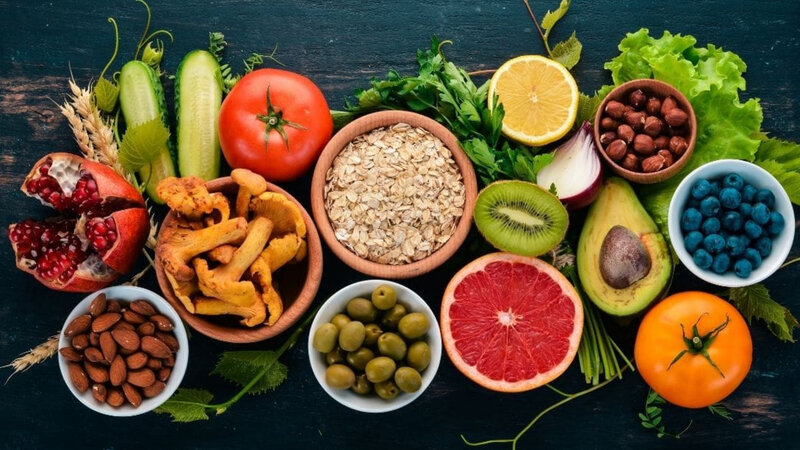Antioxidant Foods – Way to Reverse Wrinkles & Look Younger
A diet rich in natural antioxidants plays a crucial role in reducing inflammation, strengthening the immune system, and preventing cellular aging. These powerful compounds help neutralize free radicals, which are unstable molecules that can damage cells and contribute to various diseases.

As we navigate the challenges posed by the Covid-19 pandemic, the need to reinforce healthy eating habits has become increasingly apparent. The stress and uncertainty experienced during this time have highlighted the importance of maintaining not only physical health but also mental well-being.
With many people feeling overwhelmed, it has become essential to focus on nourishing our bodies with foods that support immune function and promote resilience.
By prioritizing antioxidant-rich foods, such as fruits, vegetables, nuts, and whole grains, we can bolster our defenses against illness and enhance our overall vitality. This shift towards healthier eating is not just about preventing disease; it’s about fostering a lifestyle that nurtures our physical, emotional, and mental health in these trying times.
The Impact of Confinement on Eating Habits
During periods of confinement and uncertainty, many individuals turned to comfort foods, often neglecting nutritional needs. This shift has led to a rise in the consumption of ultra-processed foods, which are typically high in sugars and saturated fats. Such dietary choices are often driven by “emotional hunger,” a response to stress and anxiety. However, as restrictions ease and routines stabilize, there is a growing interest in reclaiming health through balanced nutrition and physical activity.
The Role of Antioxidants in Health
Experts emphasize the importance of focusing on nutritional concepts that genuinely promote health. A diet rich in natural antioxidants is essential for reducing inflammation and strengthening the immune system, according to a study by the National Center for Complementary and Integrative Health.
This focus on antioxidants is particularly critical for vulnerable populations, who may face heightened risks during health crises like pandemics. Dr. Laura I. Arranz, a professor at the University of Barcelona, highlights how antioxidants support a well-functioning immune system, crucial for overall health.
A strong immune response is vital, especially in times of increased health concerns. By prioritizing antioxidant-rich foods, individuals can enhance their resilience and well-being, making informed dietary choices that empower their health in challenging times.
The Protective Role of Antioxidants
As we transition into sunnier seasons, the need for antioxidants becomes even more pronounced. The skin and other tissues are exposed to increased UV radiation, which can lead to oxidative stress.
To counteract this, nutrients such as vitamin A (or beta-carotene), vitamin C, vitamin E, selenium, and other antioxidants like lycopene, resveratrol, lutein, and zeaxanthin become crucial.
These compounds help protect the body from oxidative damage, which can accelerate aging and lead to various health issues. Consuming foods rich in these antioxidants not only supports skin health but also contributes to overall well-being.
What are Antioxidants?
Antioxidants are molecules capable of delaying or preventing the oxidation of molecules that are produced by the transfer of electrons from a substance to an oxidizing agent, as specified by Iñaki Elío, academic director of the Degree in Nutrition at the European University of the Atlantic.
He adds, “By losing electrons, these substances can become unstable and become free radicals, which react in a chain and can damage cells.” In fact, according to the expert, a diet low in antioxidants can accelerate aging and favor the appearance of certain types of cancer, as well as cardiovascular and metabolic diseases.
In addition, as he adds, his part, it is not only important to take into account the importance of antioxidants, but we must prepare for possible outbreaks of coronavirus in the face of autumn because, as he says, it is at that time of year when the immune system may be more compromised.
Types of Antioxidants
In general terms, antioxidants can be divided, as explained by Professor Elío, into three large groups: polyphenols, carotenoids, and vitamins of Group C and E.
1. Vitamins
Vitamin C: Vitamin C, found in citrus fruits, strawberries, and bell peppers, is a potent water-soluble antioxidant. It supports immune function, promotes collagen production for skin health, enhances iron absorption, and plays a key role in protecting against skin aging.
Vitamin E: Vitamin E, found in nuts like almonds, seeds, and green leafy vegetables, is a fat-soluble antioxidant that protects cell membranes from oxidative damage. It is vital for immune function and skin health, reduces inflammation, and supports heart health. Deficiency may lead to neurological issues and a weakened immune response.
2. Minerals
Selenium:Selenium, an essential trace mineral found in Brazil nuts, fish (like tuna and sardines), and eggs, is crucial for the function of antioxidant enzymes. It helps neutralize free radicals, reduce inflammation, support thyroid function, and enhance immune health. Adequate selenium intake is associated with a lower risk of certain cancers.
Zinc: Zinc, present in meat, shellfish, legumes, nuts, and seeds, is essential for immune function, wound healing, and DNA synthesis. As a component of various antioxidant enzymes, it helps stabilize cell membranes and protects against oxidative stress. Zinc deficiency can impair immune response and increase susceptibility to infections.
3. Phytochemicals
Flavonoids:
Carotenoids:Carotenoids, including beta-carotene (in carrots), lutein (in leafy greens), and lycopene (in tomatoes), are pigments with antioxidant properties that protect against oxidative damage. Beta-carotene converts to vitamin A, vital for vision and immune function, while lycopene is linked to a reduced risk of prostate cancer and heart disease.
4. Polyphenols
Polyphenols, found in red wine, green tea, dark chocolate, fruits, and vegetables, are known for their antioxidant and anti-inflammatory properties. They help lower blood pressure, improve heart health, enhance insulin sensitivity, and may promote beneficial gut bacteria growth.
5. Enzymatic Antioxidants
Superoxide Dismutase (SOD), Catalase, and Glutathione Peroxidase are essential enzymes that detoxify harmful free radicals. SOD converts superoxide radicals, Catalase breaks down hydrogen peroxide, and Glutathione Peroxidase reduces oxidative stress, collectively protecting cells from damage.
6. Coenzymes
Coenzyme Q10 (CoQ10): This compound, found in every cell, is essential for energy production in the mitochondria and acts as a potent antioxidant. It helps protect cells from oxidative stress, particularly in the heart and muscles. CoQ10 levels can decrease with age or certain health conditions, so supplementation may be beneficial for improving energy levels and overall health.
7. Other Antioxidants
Alpha-lipoic acid: A unique antioxidant that is soluble in both water and fat, alpha-lipoic acid helps regenerate other antioxidants like vitamins C and E. It plays a role in energy metabolism and may improve insulin sensitivity, making it beneficial for managing blood sugar levels. Its ability to cross the blood-brain barrier also gives it potential neuroprotective effects.
Curcumin:Curcumin, found in turmeric, is known for its powerful anti-inflammatory and antioxidant properties. It may reduce the risk of chronic diseases like heart disease and certain cancers by combating oxidative stress. Pairing it with black pepper enhances its absorption.
How Do You Take Antioxidants?
By incorporating a variety of antioxidant-rich foods into your daily meals and being mindful of lifestyle choices, you can effectively boost your antioxidant intake and support your overall health. Below are some excellent sources of antioxidants:
1. Eat a Variety of Fruits and Vegetables
Aim for a colorful plate! Different colors often indicate different types of antioxidants, which provide a range of health benefits. For example, red and purple fruits like cherries and blueberries are rich in anthocyanins, while orange and yellow fruits such as carrots and sweet potatoes provide beta-carotene.
Incorporating a wide variety not only enhances your nutrient intake but also keeps meals interesting. Try seasonal produce to ensure freshness and maximize flavor.
2. Choose Whole Foods Over Processed
Whole foods tend to be richer in antioxidants compared to processed foods, which often lose nutrients during manufacturing. Opt for fresh or frozen fruits and vegetables rather than canned or pre-packaged options, which can contain added sugars and preservatives.
Reading labels can help you make healthier choices. Look for products with minimal ingredients and those that emphasize whole grains and natural components.
3. Include Nuts and Seeds
Snack on a handful of nuts like almonds, walnuts, and hazelnuts, which are not only packed with antioxidants but also healthy fats and protein. These can help keep you satiated and provide essential nutrients.
Sprinkle seeds like flaxseeds, chia seeds, or pumpkin seeds on your meals or in smoothies. These seeds are rich in omega-3 fatty acids and other antioxidants that can support heart and brain health.
4. Incorporate Herbs and Spices
Use herbs and spices such as turmeric, cinnamon, garlic, and ginger in your cooking. These not only add flavor but also provide significant antioxidant benefits. For instance, turmeric contains curcumin, known for its anti-inflammatory and antioxidant properties.
Experiment with different combinations in your dishes. Adding fresh herbs to salads or using spices in marinades can elevate your meals while boosting their health benefits.
5. Drink Antioxidant-Rich Beverages
Enjoy green tea, black tea, and herbal teas, which are rich in polyphenols. These compounds have been linked to various health benefits, including improved heart health and reduced risk of certain cancers.
Coffee also contains antioxidants, particularly chlorogenic acid. Just be mindful of your overall caffeine intake and consider limiting added sugars and creams that can diminish the health benefits.
6. Consider Supplements
If you struggle to get enough antioxidants from food, consider high-quality supplements. However, it’s crucial to consult with a healthcare provider before starting any supplements to determine what’s appropriate for you, as some can interact with medications or have side effects.
Look for supplements that contain a blend of antioxidants, such as vitamins C and E, coenzyme Q10, and selenium, to maximize potential benefits.
7. Limit Exposure to Oxidative Stress
Reducing lifestyle factors that generate free radicals, such as smoking, excessive alcohol consumption, and high-stress levels, can enhance the effectiveness of antioxidants in your diet. Practicing stress management techniques like yoga, meditation, or deep-breathing exercises can also be beneficial.
Consider environmental factors, too; reducing exposure to pollutants and toxins in your surroundings can further decrease oxidative stress.
8. Balance Your Diet
A balanced diet that includes healthy fats, proteins, and carbohydrates can help support overall antioxidant activity in the body. Incorporate sources of omega-3 fatty acids (like fatty fish and flaxseeds), lean proteins, and whole grains for a comprehensive nutrient profile.
Planning meals that combine various food groups can enhance nutrient absorption and provide a wide range of antioxidants. For example, pairing healthy fats with vegetables can help absorb fat-soluble vitamins like A, D, E, and K.
Which is Better, Raw or Steamed?
When it comes to consuming vegetables, the choice between steamed and raw often depends on the specific vegetable and your health goals. Here’s a comparison of both methods, highlighting their benefits:
Raw Vegetables
Benefits:
- Higher Nutrient Content: Some vitamins and minerals, particularly vitamin C and certain B vitamins, can be sensitive to heat. Eating vegetables raw preserves these nutrients.
- Enzyme Retention: Raw vegetables contain natural enzymes that can aid digestion and support gut health.
- Fiber Content: Raw vegetables retain their full fiber content, which is beneficial for digestive health and can help keep you feeling full.
Best Choices: Leafy greens (spinach, kale), bell peppers, cucumbers, carrots, and broccoli can be delicious and nutritious when consumed raw.
Steamed Vegetables
Benefits:
- Improved Digestibility: Steaming can break down tough fibers, making some vegetables easier to digest, especially for individuals with sensitive digestive systems.
- Enhanced Nutrient Absorption: For certain vegetables, steaming can enhance the bioavailability of nutrients. For example, steaming carrots increases the availability of beta-carotene, a precursor to vitamin A.
- Reduced Antinutrients: Steaming can reduce the levels of antinutrients (like oxalates and goitrogens) that may interfere with nutrient absorption in some vegetables.
Best Choices: Broccoli, carrots, asparagus, and cauliflower often benefit from steaming, as it enhances their nutrient content and flavor while making them tender.
By prioritizing antioxidant-rich foods, individuals can enhance their resilience and overall well-being, empowering themselves to navigate health challenges more effectively. This proactive approach not only supports immune function but also fosters a long-term commitment to a healthier lifestyle

























